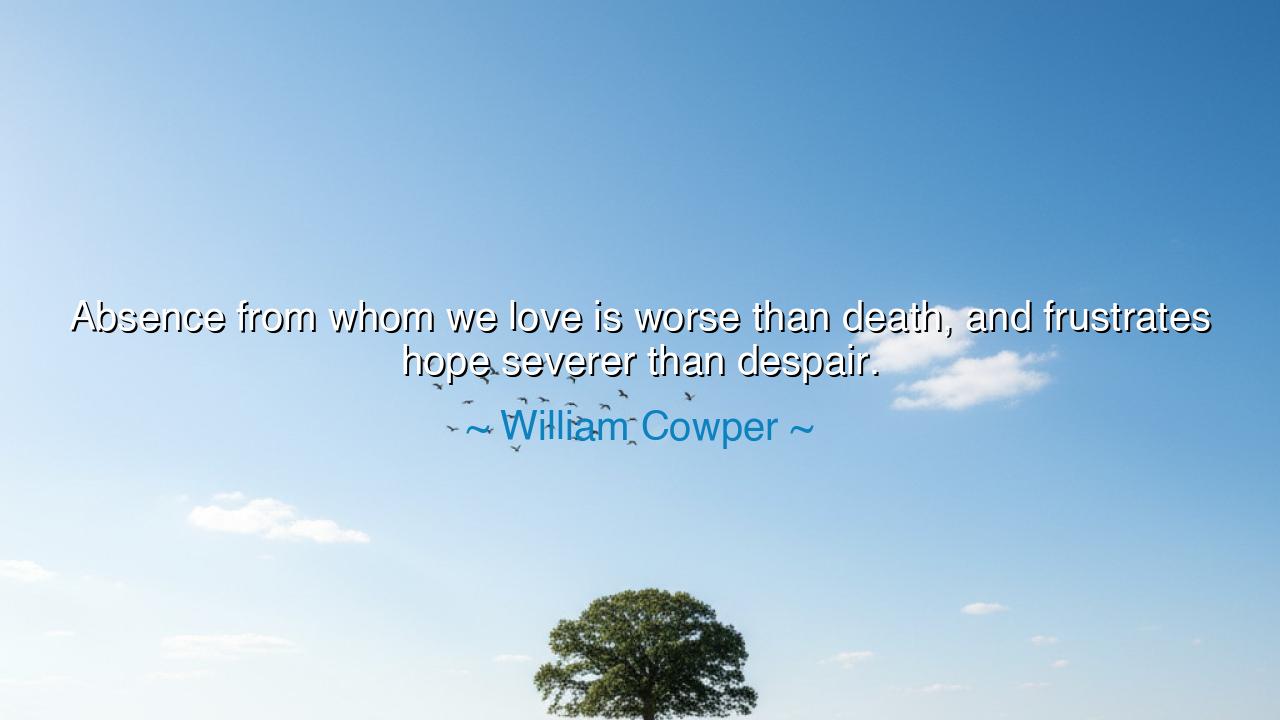
Absence from whom we love is worse than death, and frustrates
Absence from whom we love is worse than death, and frustrates hope severer than despair.






Hearken, O children of the heart and spirit, and attend to the words of William Cowper, the poet of longing and sentiment, who proclaimed: “Absence from whom we love is worse than death, and frustrates hope severer than despair.” In these words lies a meditation upon the pangs of separation, the depths of longing, and the fragile nature of human attachment. To be absent from the beloved is to endure a suffering that strikes the soul more deeply than physical demise, and to feel hope challenged by the cruel distance that separates hearts.
Since the dawn of human affection, mortals have felt the torment of separation. From Odysseus yearning for Penelope across the sea, to the lovers of ancient Persian poetry, the ache of absence has been a timeless theme. Cowper’s reflection captures this universal truth: absence intensifies longing, magnifies uncertainty, and tests the strength of attachment in ways that proximity cannot. The soul suffers not merely in body, but in spirit, when love is distant, and the heart’s hope trembles under the weight of longing.
Consider the story of Abelard and Heloise, whose love in twelfth-century France was torn apart by circumstance, separation, and societal constraint. Letters written across distance became both solace and torment, illustrating Cowper’s insight that absence frustrates hope severer than despair, for the mind clings to imagined reunion even as the present denies it. Their story, like Cowper’s words, teaches that love and separation are intertwined, and that longing is both a test and a testament to devotion.
The essence of Cowper’s meditation lies in the fragility and strength of human bonds. To love is to risk suffering, and to endure absence is to confront the limits of control over life and circumstance. Death ends presence, yet absence prolongs desire, leaving the heart suspended between memory and expectation. It is in this liminal space that hope is most vulnerable, for longing without fulfillment can weigh heavier than certainty itself.
In another sense, Cowper’s insight teaches resilience. The pain of absence, though severe, illuminates the depth of one’s attachment and the value of connection. During World War II, countless soldiers and their families endured years apart. Letters, photographs, and memories became the anchors of hope, sustaining spirits across oceans and battlefields. The suffering of absence, though intense, also nurtured patience, endurance, and the capacity to cherish reunion, reflecting the dual nature of longing.
O seeker, take this teaching into your own life: recognize that separation is both a burden and a teacher. Let absence illuminate the strength of your attachment, deepen your appreciation for presence, and cultivate patience in anticipation. Hope may be tested, but it is also strengthened by endurance and reflection. The heart learns its capacity for love, resilience, and empathy through the trials of distance.
Moreover, understand that longing need not lead to despair. Cowper’s words remind us that absence sharpens awareness of what is cherished. Acts of remembrance, communication, and intentional reflection transform suffering into devotion, and frustration into affirmation. By embracing the depth of feeling without being consumed by it, one honors both the beloved and oneself.
Thus, William Cowper’s words endure as both reflection and guidance: absence from whom we love challenges the soul, but it also illuminates the power of attachment, the fragility of hope, and the endurance of love. Walk with awareness of these truths, cultivate patience, and treasure presence when it returns, for in the tension between longing and fulfillment lies the richness of human devotion and the resilience of the heart.
If you wish, I can also craft a short illustrative story showing someone enduring absence and discovering hope and love through patience, making Cowper’s philosophy vividly tangible for listeners. Would you like me to do that?






AAdministratorAdministrator
Welcome, honored guests. Please leave a comment, we will respond soon